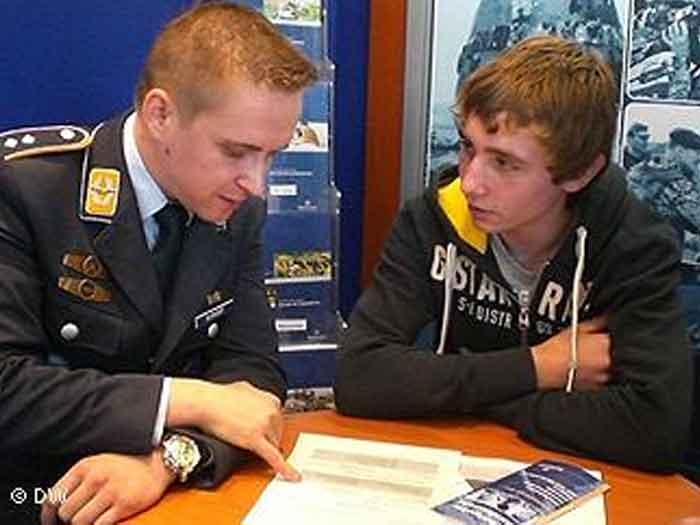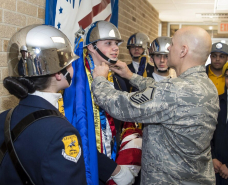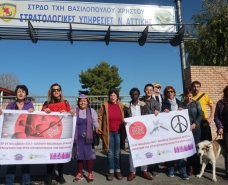Military school in Austria

School life in army green
4 February 2015, by Stephan Löwenstein, Wiener Neustadt, Frankfurter Allgemeine Zeitung
Wiener Neustadt is home to a school run by the Austrian armed forces which offers pupils a “pre-military” education. But funding cuts are threatening the school’s future.
“Alumni” at the military school are taught subjects like mathematics by civilian teachers.
Lesson five, mathematics. It’s not long before the lunch break, and twenty-two young people are puzzling over equations. When the headmaster pops his head around the classroom door, they all jump to their feet, put their arms behind their backs and stand to attention. They stand like soldiers, and they’re dressed like soldiers, boys and girls alike, with sturdy black shoes, olive-green combat trousers, ironed olive-green shorts, epaulettes with two gold stripes. But they’re not soldiers – they’re fifteen or sixteen-year-old pupils at an Austrian school. They take exactly the same curriculum as any other children of their age.
Yet this isn’t a school like any other. It’s an institution run by the military, right next door to the Theresian Military Academy in Wiener Neustadt, a city that’s about an hour’s drive from Vienna. The neighbouring military academy is where the Austrian armed forces train their officers. Teachers at the school are civilians, but the boarding home wing is overseen by the military. Extracurricular activities are likewise olive-green in colour – once a week, pupils attend “pre-military classes” where they learn about different weapons and the structure and mandate of the armed forces.
However, the children don’t get to handle weapons like they used to ten years ago, when the older pupils received “school shooting tuition”. But what the children do get is plenty of physical education – the usual sporting disciplines, but climbing, life-saving, orienteering or horse-riding are also available for those so inclined. The military school uses the officers’ sports facilities next door, including the obstacle course, except that the youngsters aren’t yet allowed to do the more difficult jumps.
There are similar schools in Britain and France – Welbeck College and Lycée Militaire de Saint-Cyr – but it would be beyond the realm of the imagination for the German armed forces to run one in Germany. And judging by the wishes of the Austrian defence ministry, it now looks like the days of Austria’s military school are numbered, too. The talk in military circles is of closure in two years, while the left-right coalition in Vienna passed a resolution in the dying days of 2014 to shut down the institution in four years.
Headmaster learned in media of school’s fate
It was purely and simply the need to curb costs which prompted defence minister Gerald Klug to add the military school to his list of cutbacks. That at least was the official reason given. There was talk initially of €10 million in savings. That figure has since been dramatically reduced. Cutting the operating costs didn’t amount to much, a defence ministry spokesman was quoted as saying. Standby services and office materials came to something like €50,000 p.a. Extracurricular activities for pupils tied up staffing capacities.
Schooling costs in the narrower sense of the term – teachers’ salaries, mostly – are covered by the Austrian education ministry, just like they are at any other publicly or privately-run school in the country. As for board and accommodation at the boarding home, parents contribute roughly €3,500 each year. In the spokesman’s words the main saving for the Austrian armed forces arises from “follow-on changes”. That is to say, the wing of Daun Barracks housing the school and the boarding home would then be freed up for other purposes.
Girls and boys aged 14 and over are welcome at the military school.
When news emerged last autumn that the school was to be shut down, the pupils and teaching staff alike were shocked. Like others, headmaster Werner Sulzgruber first heard about the school’s fate from the media. He had only taken up his post a few days earlier. But he’s nonetheless passionate about saving the school, calling it “unique in the educational landscape”. There was a special community spirit at the school, he said, adding that it brought together children from all over Austria and that educators were also willing to help out with school-related problems.
Standing to attention, saluting officers in the corridors, spending the day with activities other than computer games, sharing rather spartan quarters with three other pupils, being woken by the daily wake-up call and retiring to bed at curfew. Why on earth would a fourteen-year-old want to go to a boarding school like this, where pupils are still called “alumni”?
Parents were shocked
One boy in his first year at the school says that he had “always” wanted to join the armed forces, and had noticed this school in an online advertisement. But it did take some getting used to, he explained, adding that he had often had sore muscles “and things like that” early on. Another boy says he joined “because of the physical education” – the obstacle course, the climbing gym, the outdoor survival training – but the dancing course and the first aid training had also appealed to him. A girl, meanwhile, nodded towards the stables – riding! – some pupils had even been allowed to bring their own horses.
One boy who is already in his third year at the school waxes lyrical about the life lessons he was learning there. “Respect, primarily, how to behave, and you really get to know your own personality. I never used to know if what I was doing was good or bad. I didn’t used to have much self-confidence, but that’s what I’ve learnt here.” In any case, it appears that it isn’t necessarily always the parents who send their children here, even if the school was originally opened in the 1960s chiefly for the children of professional soldiers. Several children recount that their parents were initially quite shocked at the news that their children wanted to go to the military school.
Christian Vesligey, head boy at the military school.
Christian Vesligey, head boy, was one of them. He’s also one of the pupils who is considering a career in the military. “If I wanted to become a carpenter I’d take an apprenticeship; if I wanted to be a programmer, I’d join a technical college.” But not all the children are quite as enthusiastic about the idea of combining “A-levels with adventure” (the slogan on the school’s website) in Wiener Neustadt. Out of the annual intake of 65 children hitherto, fewer than half have completed their schooling there in recent years.
No political response
Some pupils had failed to progress at school, others had fallen short of the physical education requirements, explains Colonel Meinhardt, the school’s military chief, but for most it was life at a boarding school far from home which made them give up before the end of their four-year stay. But those that are there appear to be very passionate about the school. And the pupils who have actively campaigned against the closure of the school are anything but obedient, zombie-like underlings or underage puppets controlled and manipulated by others. In fact, they seem remarkably mature and thoughtful.
They collected 35,000 signatures, organised a relay race to Vienna to hand in a petition and sought talks with the country’s federal president. But their campaigning has failed to spark a political response. While Austria’s regional governors fought with all their might for the armed forces to retain a military band in each of the country’s federal states, the military school still faces closure. The only promise made so far, and still a rather vague one at that, is that the education ministry would see to it that pupils who enrolled this year will also stay on track and complete their schooling within four years.
For the ministry, the school is an open-and-shut case. Funding is scarce, the ministry reasoned, so the armed forces needed to focus on their core areas of competence, and running a school most certainly did not belong to the military’s main capabilities. And in any case, the handful of office cadets that the army still recruited these days would be easy to get hold of. It is another question whether advertising can achieve the same positive effect (more cheaply) as the image which school leavers from this army-run institution – young adults from all over the country – have enjoyed thus far.
Translation from the German by Ben
Source: http://www.faz.net/aktuell/politik/ausland/europa/oesterreichische-milit...
Countering Military Recruitment

WRI's new booklet, Countering Military Recruitment: Learning the lessons of counter-recruitment campaigns internationally, is out now. The booklet includes examples of campaigning against youth militarisation across different countries with the contribution of grassroot activists.
You can order a paperback version here.







